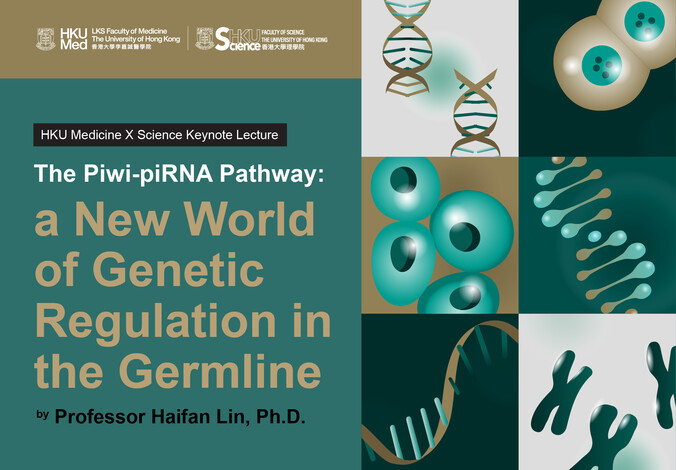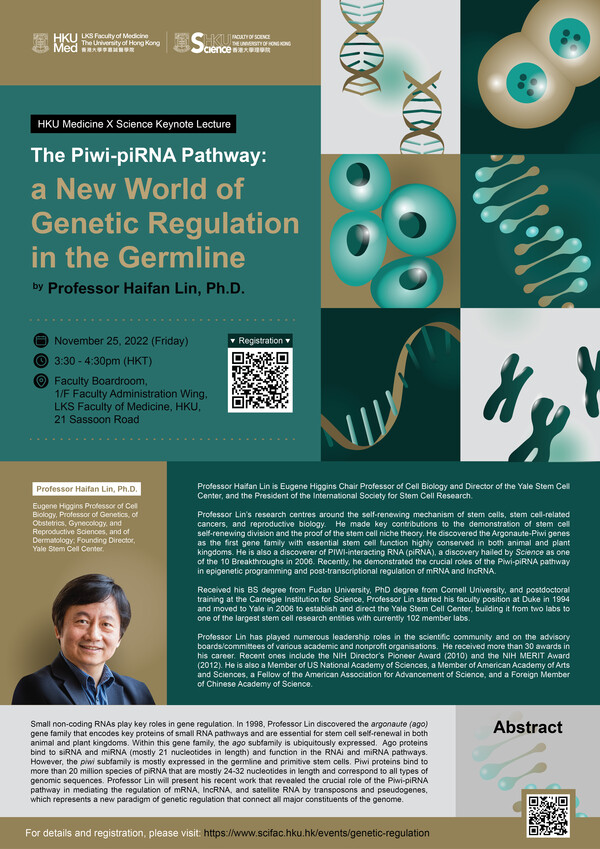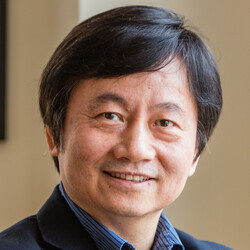HKU Medicine x Science Keynote Lecture: The Piwi-piRNA Pathway: a New World of Genetic Regulation in the Germline

- Date & Time
- November 25, 2022 (Friday) | 3:30 - 4:30 pm (HKT)
- Venue
- Faculty Boardroom, 1/F Faculty Administration Wing, LKS Faculty of Medicine, HKU, 21 Sassoon Road
- Speaker
- Professor Haifan LIN, PhD
Eugene Higgins Professor of Cell Biology, Professor of Genetics, of Obstetrics, Gynecology, and Reproductive Sciences, and of Dermatology; Founding Director, Yale Stem Cell Center

Small non-coding RNAs play key roles in gene regulation. In 1998, Professor Lin discovered the argonaute (ago) gene family that encodes key proteins of small RNA pathways and are essential for stem cell self-renewal in both animal and plant kingdoms. Within this gene family, the ago subfamily is ubiquitously expressed. Ago proteins bind to siRNA and miRNA (mostly 21 nucleotides in length) and function in the RNAi and miRNA pathways. However, the piwi subfamily is mostly expressed in the germline and primitive stem cells. Piwi proteins bind to more than 20 million species of piRNA that are mostly 24-32 nucleotides in length and correspond to all types of genomic sequences. Professor Lin will present his recent work that revealed the crucial role of the Piwi-piRNA pathway in mediating the regulation of mRNA, lncRNA, and satellite RNA by transposons and pseudogenes, which represents a new paradigm of genetic regulation that connect all major constituents of the genome.

Speaker Professor Haifan LIN, PhD
Eugene Higgins Professor of Cell Biology, Professor of Genetics, of Obstetrics, Gynecology, and Reproductive Sciences, and of Dermatology; Founding Director, Yale Stem Cell Center
Professor Haifan is Eugene Higgins Chair Professor Cell Biology and Director of the Yale Stem Cell Center, and the President of the International Society for Stem Cell Research. Professor Lin studies the self-renewing mechanism of stem cells, stem cell-related cancers, and reproductive biology. He made key contributions to the demonstration of stem cell self-renewing division and the proof of the stem cell niche theory. He discovered the Argonaute-Piwi genes as the first gene family with essential stem cell function highly conserved in both animal and plant kingdoms. He is also a discoverer of PIWI-interacting RNA (piRNA), a discovery hailed by Science as one of the 10 Breakthroughs in 2006. Recently, he demonstrated the crucial roles of the Piwi-piRNA pathway in epigenetic programming and post-transcriptional regulation of mRNA and lncRNA. Professor Lin received his BS degree from Fudan University, PhD degree from Cornell University, and postdoctoral training at the Carnegie Institution for Science. He joined the faculty of Duke University Medical School in 1994, where he rose to Full Professor. He founded and directed Duke Stem Cell Research Program (2005-2006) and moved to Yale in 2006 to establish and direct the Yale Stem Cell Center, building it from two labs to one of the largest stem cell research entities with currently 102 member labs. With Yale’s support, he served as the Adjunct Founding Dean of School of Life Science and Technology at ShanghaiTech University (with <10% effort, 2014-2022), building a world-class School with 74 faculty members. Professor Lin has played numerous leadership roles in the scientific community. He is the President of the International Society for Stem Cell Research (ISSCR, 2022-2023). Previously, He served as President-Elect (2021-2022), Vice President (2020-2021), Director (2009-2019, 2020-present), Treasurer (2013-2016), and Chair of various committees (2009-present) of the ISSCR, as well as on the advisory boards/committees of more than 30 other academic and nonprofit organisations. Professor Lin received more than 30 awards in his career. Recent ones include the NIH Director’s Pioneer Award (2010), the NIH MERIT Award (2012), the Ray Wu Award (2013), and the Society for the Study of Reproduction Research Award (2015), and The Chinese Association for Science and Technology, USA, Outstanding Science and Innovation Award (2019). He is a Member of US National Academy of Sciences, a Member of American Academy of Arts and Sciences, a Fellow of the American Association for Advancement of Science, and a Foreign Member of Chinese Academy of Science.


